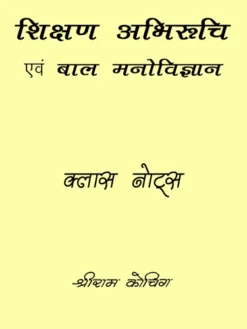-32%
Original price was: ₹325.₹220Current price is: ₹220.
Information about various competitive exams such as L.T. (Licentiate in Teaching), T.G.T. (Trained Graduate Teacher), P.G.T. (Post Graduate Teacher), and Lecturer exams.
-
L.T. (Licentiate in Teaching):
- Eligibility: Typically, candidates with a Bachelor's degree in Education (B.Ed.) are eligible for L.T. exams. However, specific eligibility criteria may vary depending on the state or conducting body.
- Exam Structure: L.T. exams often include subjects related to teaching methodology, educational psychology, and general knowledge. The exam assesses a candidate's understanding of pedagogical concepts and teaching techniques.
-
T.G.T. (Trained Graduate Teacher):
- Eligibility: To appear for T.G.T. exams, candidates usually need a Bachelor's degree in the relevant subject along with a B.Ed. degree. The eligibility criteria may differ based on the state or educational institution conducting the exam.
- Exam Structure: T.G.T. exams focus on testing the candidate's proficiency in the chosen subject area. The examination may include questions related to the subject, teaching aptitude, and general knowledge.
-
P.G.T. (Post Graduate Teacher):
- Eligibility: Candidates aspiring for P.G.T. exams are generally required to have a Master's degree in the relevant subject along with a B.Ed. degree. The specific eligibility criteria may vary based on the exam-conducting authority.
- Exam Structure: P.G.T. exams assess the candidate's in-depth knowledge of the subject and teaching expertise. The examination may include questions on the chosen subject, educational psychology, teaching methods, and general awareness.
-
Lecturer Exams:
- Eligibility: Lecturer exams typically require candidates to have a postgraduate degree in the relevant subject along with a Ph.D. or NET/SLET qualification. Eligibility criteria may vary based on the state or university conducting the exam.
- Exam Structure: Lecturer exams assess candidates for their expertise in a particular subject. The examination includes questions related to the chosen subject, research methodology, and teaching proficiency.
Preparation Strategies:
- Subject Proficiency: A strong command of the chosen subject is crucial. Regular study and practice in the subject area are essential.
- Teaching Aptitude: Candidates are evaluated on their understanding of teaching methods, educational psychology, and pedagogy. Aspirants should be familiar with effective teaching techniques.
- General Knowledge: Stay updated with current affairs, educational policies, and developments in the field of education.
- Mock Tests and Previous Papers: Practice mock tests and solve previous years' question papers to understand the exam pattern and improve time management skills.
- Effective Time Management: Develop a study schedule that allocates time to each subject and topic. Focus on weak areas and revise regularly.
Remember, each exam may have its unique nuances, and it's crucial to check the specific eligibility criteria and exam pattern for the exam you are interested in. Additionally, staying informed about the latest updates from the respective exam-conducting authorities is essential.

